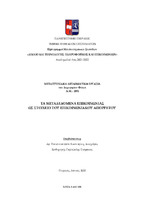Τα μεταδεδομένα επικοινωνίας ως στοιχείο του επικοινωνιακού απορρήτου

Master Thesis
Συγγραφέας
Φάκας, Δημήτριος
Ημερομηνία
2022-06Επιβλέπων
Παπανικολάου, ΑικατερίναΓκρίτζαλης, Στέφανος
Προβολή/
Λέξεις κλειδιά
Μεταδεδομένα επικοινωνίας ; Επικοινωνιακό απόρρητοΠερίληψη
Το συνταγματικά κατοχυρωμένο δικαίωμα στην απόρρητη επικοινωνία αποτελεί προϋπόθεση όσο και σημείο τομής για την άσκηση πολλών άλλων θεμελιωδών δικαιωμάτων. Λόγω ακριβώς της νευραλγικής του θέσης στη διεθνή αλλά και εθνική έννομη τάξη, τα ζητήματα που σχετίζονται με την προστασία του εκτείνονται από τον τεχνικό τρόπο λειτουργίας των σύγχρονων μέσων επικοινωνίας και καταλήγουν στο θεσμικό πλαίσιο και τον τρόπο εφαρμογής του.
Αναπόσπαστο τμήμα κάθε επικοινωνίας, πέραν του ίδιου του περιεχομένου, είναι το πλαίσιό της, το οποίο αποδίδεται με τον όρο μεταδεδομένα επικοινωνίας. Τα πρόσωπα των επικοινωνούντων, ο χρόνος, η διάρκεια, η γεωγραφική θέση είναι πληροφορίες που παράγονται από τα χρησιμοποιούμενα μέσα και συλλέγονται από τους παρόχους υπηρεσιών επικοινωνιών κατ’ αρχήν για σκοπούς υλοποίησης μιας επικοινωνίας όσο και χρέωσής της.
Η ιστορία της δημιουργίας και αξιοποίησης μεταδεδομένων (στη γενική τους διάσταση) είναι παλαιά και αφορά τη διευκόλυνση γρήγορου εντοπισμού και οργάνωσης πληροφοριών. Στην εξέλιξη της ιστορίας, ακριβώς αυτή η ιδιότητά τους, μετατόπισε το ενδιαφέρον των υπηρεσιών ασφαλείας από τη χρήση παραδοσιακών μεθόδων παρακολούθησης (συνακρόαση), στην ανάλυση σημαντικού όγκου μεταδεδομένων επικοινωνίας.
Οι πληροφορίες αυτές είναι ιδιαίτερα αποκαλυπτικές τόσο σε σχέση με το περιεχόμενο αυτής όσο και σε σχέση με το προφίλ της ζωής των επικοινωνούντων, πορίσματα τα οποία έχουν επιβεβαιωθεί και σε ερευνητικό επίπεδο. Η διάκριση περιεχομένου και μεταδεδομένων στη σημερινή εποχή, θα πρέπει να θεωρείται πια ξεπερασμένη.
Η προστασία των μεταδεδομένων επικοινωνίας ως τμήμα του απορρήτου της επικοινωνίας, αναγνωρίζεται τόσο από την νομολογία όσο και τη νομοθεσία, σε ευρωπαϊκό και εθνικό επίπεδο, δίχως ωστόσο να απουσιάζουν και αντίθετες απόψεις.
Το εθνικό θεσμικό πλαίσιο για την άρση του απορρήτου όσο και ο τρόπος εφαρμογής του, προκαλούν σοβαρές ανησυχίες σε σχέση με την ικανοποιητική προστασία του δικαιώματος στην απόρρητη επικοινωνία. Συνεκτιμώντας τις ευρείες δυνατότητες εξαγωγής συμπερασμάτων από την ανάλυση μεταδεδομένων επικοινωνίας, φαίνεται να καταλείπονται σημαντικά ελλείματα και το εν γένει πλαίσιο προστασίας να έρχεται σε αντίθεση με τμήμα της νομολογίας του ΕΔΔΑ και του ΔΕΕ.

